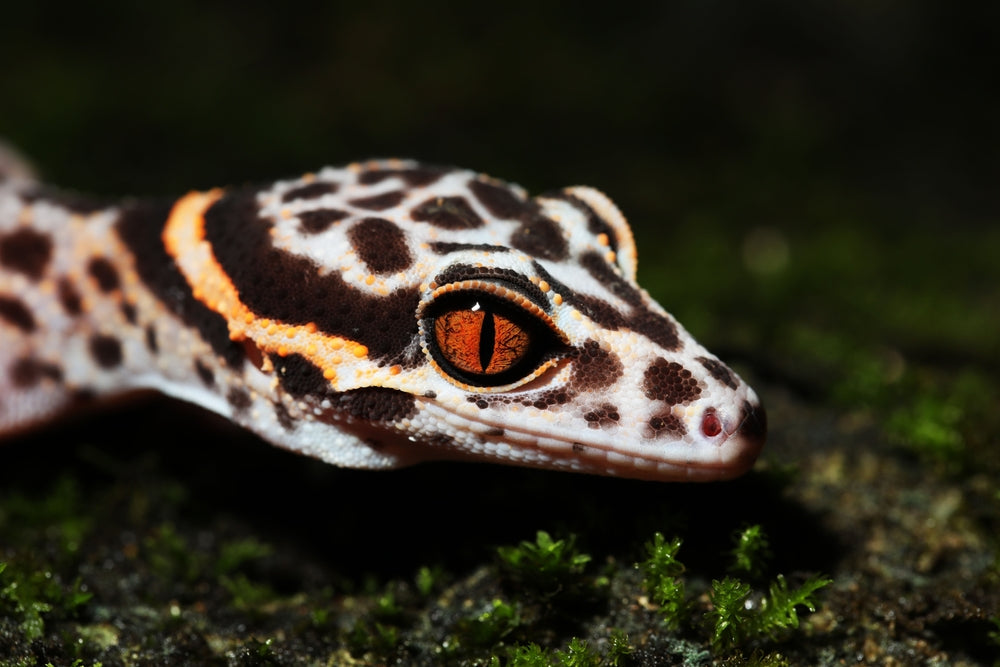Intro
Cave geckos are nocturnal, terrestrial lizards that are both easy to care for
and straightforward to breed. The Chinese Cave Gecko (Goniurosaurus
hainanensis) is native to two islands of China, Hainan and Cat Ba. Due to
its striking appearance and ease of care, this beautiful gecko is becoming
enormously popular with reptile keepers. Adults reach eight inches and
can normally be housed at room temperature with no supplemental
heat.
General Care and Feeding
Like most geckos, Chinese Cave Geckos do very well housed alone.
Keepers who wish to produce offspring may consider keeping a male and
female together year-round. A ten-gallon tank or similarly sized terrarium
such as those made by ExoTerra and ZooMed is adequate housing for one
to two adults. See the HOUSING section below for information on terrarium
set-up.
Chinese Cave Geckos are insectivorous. They will thrive on appropriately
sized (width of gecko head) crickets and dubia roaches. Crickets and/or
roaches should be gut-loaded with nutritious foods for twenty-four hours
before being offered as prey and should be coated with a quality reptile
vitamin supplement. Black soldier fly larvae (aka ReptiWorms™ or Phoenix
Worms®), waxworms, butterworms, and, occasionally, small mealworms
may be offered to provide beneficial variety to the diet.
Chinese Cave Geckos store fat in their tails and a well-fed gecko will have
a plump tail. Monitoring the condition and size of the tail will help the
keeper ensure that the gecko is sufficiently fed and hydrated. A small
shallow water dish filled with fresh water will provide a drinking
source.
Housing
A ten-gallon tank or terrarium of similar size is adequate for a single adult
Chinese Cave Gecko or a pair of adults. Something along the lines of
ExoTerra’s 18x18x12 glass terrarium can be used to make an attractive
home and may house several adult cave geckos. However, only one male
should be housed in each cage as they are territorial and will battle.
Coconut fiber (e.g., EcoEarth®) makes a fine substrate, but a 50/50 mix of
peat moss and sand may also be used. Terrarium moss can be added to
the surface to enhance the beauty of the terrarium and keeping it moist
in one corner of the enclosure will help provide some humidity. Hiding
places should be provided and slabs of virgin cork bark and the reptile
caves and hiding places found in the pet trade make excellent retreats. A
few rocks can be added to the decor and a water dish is essential.
In most homes Chinese Cave Geckos will thrive at ambient room
temperatures and supplemental heating is not required. Temperatures
over 80ºF should be avoided and high temperatures may be quickly
lethal. Most homes are kept in the 65-75ºF range throughout the year and
cave geckos do quite well in this same range.
Since Chinese Cave Geckos are active at night, they don’t require the UV
exposure that many pet lizards do and a simple fluorescent light can be
used to illuminate the terrarium so its beauty can be enjoyed during the
day. This is especially important if you choose to decorate the terrarium
with any live plants. Any lighting should be controlled by a timer to ensure
that these nocturnal geckos get at least twelve hours of darkness. Some
keepers may choose to add a terrarium fixture with a low-wattage red
bulb to aid in viewing these geckos at night when they are active.
Housing Young Cave Geckos
Hatchling and juvenile cave geckos may be raised in groups, but there is
the risk that feeding dominance may cause more timid or smaller young to
not thrive, and feeding behavior may cause some to lose their tails. These
tails will regenerate but never look as perfect and many keepers prefer to
raise young cave geckos individually. An opaque plastic container like an
empty spreadable cream cheese tub can be used to make a simple retreat. It should have an entrance hole cut in the side that is large enough for the gecko,
but small enough that it keeps out as much light as possible and makes for a secure retreat. Damp sphagnum moss should be placed inside and kept moist so that the gecko has sufficient humidity.
Handling and Activity
Young cave geckos are best left alone and not handled, but larger
specimens can be carefully handled if desired. Adults will learn to tolerate
occasional gentle handling.
Health
Chinese Cave Geckos are hardy lizards that are easy to raise if their basic
care and environmental parameters are met. Occasional skin-sloughing
difficulties may be indicators of insufficient humidity. A hide box filled
with damp sphagnum moss should alleviate this problem.
Sexing
Chinese Cave Geckos begin to mature at about five or six months of age.
At this time, male geckos will begin to show distinct bulges at the base of
the tail where their hemipenes lie inside.
Breeding
All that is necessary to breed cave geckos is housing an adult sexual pair
together. However, breeding success can be enhanced by cooling the
pair below their normal range for a few months during the winter. Mating
generally takes place between February and September and during this
period females will lay a pair of eggs every 30-45 days. An egg-laying
container such as a margarine tub with an entrance hole cut into the lid
must be provided. Fill the container with moist vermiculite or sphagnum
moss. Extra care should be taken with breeding females to ensure they
get enough food that has been gut-loaded and dusted at each feeding
with a quality calcium supplement. A great deal of her calcium stores will
go into egg production and need to be replenished during the breeding
season.
Those who choose to breed these geckos should consider removing the
male in July or August to give the female a break. Egg-laying uses her
resources and having a few months alone to eat more food before the
winter cooling will ensure she has a healthy reproductive life. Males and
females can be housed together again after the cooling period.


Share:
Green Keel-Bellied Lizard Care (Gastropholis prasina)